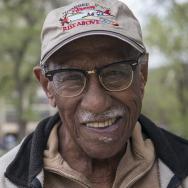Civil rights activist and Chicago historian Timuel D. Black, AM’54, gracefully walked the difficult line of being critical of educational institutions while also working to improve them, according to his longtime friend and colleague Bart Schultz. Now Arsima Araya, the first recipient of Black’s namesake Community Solidarity Scholarship, an initiative led by UChicago’s Department of Race, Diaspora, and Indigeneity, continues that legacy.
After identifying a gap on campus, the rising fourth-year College student is working to better connect Black students, alumni, faculty and the local community.
Schultz, senior lecturer in Humanities (Philosophy) and director of the Civic Knowledge Project, said Araya was the “very clear winner” for the selection committee.
“[Black] wanted to see students at the University of Chicago organizing,” Schultz said. “And Arsima is really doing that with the University of Chicago Black Council and launching the Community Conversation series, which will invite members of the Chicago community, alumni, and neighborhood participants to engage in meaningful discussions about issues important to the larger University community. I think that is precisely the kind of thing Tim would have loved.”
Honoring a legend
Araya, who is working toward her degree in Global Studies & Law, Letters & Society, said she didn’t know much about Black until learning about the scholarship — but was aware of his impact on the community. She was in her first year at UChicago when Black passed away at the age of 102, with a public memorial service held at Rockefeller Memorial Chapel. She recalls it being near-impossible to get past the crowds on campus.
During his time as director of the Civic Knowledge Project (from 2003 to 2023), Schultz said he worked with many terrific community partners, “but no one more impressive than Timuel Black.” Black had a long history on the South Side and became a legendary figure as a Chicago mentor, working with the likes of Dr. Martin Luther King Jr., Harold Washington and Barack Obama. He could have a “magnetic interaction” with people at any level, Schultz said, recalling Black taking incoming UChicago undergraduates on visits to Bronzeville to explore their new neighborhoods.
“Getting the opportunity to learn more about him and his relationship with the University, I thought to myself, ‘Oh my gosh, I would love to honor him with this work,’” Araya said of her efforts with the council. “He was such a vital component of that merged identity that I am really passionate about: Black UChicago and engaging the community.”
Breaking down barriers
When Araya’s parents arrived from Eritrea in East Africa, her father befriended a South Side man who Araya says helped him understand what it meant to be Black in the U.S. Although he passed away prior to Araya’s acceptance to the University, the friend often voiced his desire for her to attend UChicago because he never felt welcomed on the campus. With this in mind, Araya has worked throughout her UChicago career to educate herself on the tensions and sensitivities between the University and community, particularly through organizations like the Community Service Center.
She also joined the Organization of Black Students (OBS), where she helped develop the idea of the University of Chicago Black Council. The group is a collaborative effort of OBS, African and Caribbean Student Association, University of Chicago Association of Black Alumni, various undergraduate and graduate Registered Student Organizations, faculty, staff and members of the community.
“I was frustrated because I go to a world class institution and I don't know who the Black faculty are unless they’re my teachers; I want to be a lawyer but I don't know any Black law students; I want to be more engaged in the community but I don't know where I can go to get more resources on how to be engaged or work with specific organizations that are in alignment with me,” she said. “I saw that gap and I said, ‘Well, why don't we fill it?’”
Araya says it has been a team and community effort to break down communication barriers internally, and then reflect that externally. The goal itself was simple: Have a chance to meet up and talk, which is how the idea for the UChicago Black Conference came to be.
A major part of the conference is the Community Conversation series. The inaugural conversation was on arts and advocacy, featuring 2022 MacArthur Foundation grant winner Amanda Williams, Lab‘92, and Patric McCoy, AB’69, a renowned Black art collector. The Community Solidarity Scholarship will help fund more of these conversations, paying for speakers and food for attendees.
